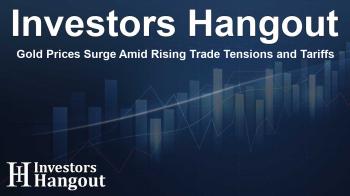Gold Prices Surge Amid Rising Trade Tensions and Tariffs

Gold Prices Surge Amid Rising Trade Tensions
Recently, gold prices have climbed significantly, approaching $3,360 as investors rush towards safer assets. This surge in gold (XAU/USD) is largely attributed to increasing geopolitical challenges and trade uncertainties that have heightened demand for this precious metal.
One major catalyst for this spike has been the recent announcement from US President Donald Trump regarding new tariffs. As markets reevaluate their risk exposure, investors are flocking to gold, seeing it as a reliable store of value during turbulent times.
In letters directed towards the EU and Mexico, Trump confirmed the implementation of a 30% tariff on imports from both regions, labeling their trade practices as a critical threat to national security. This move follows a broader series of aggressive tariff increases on more than 20 nations, including Japan, South Korea, and Canada, alongside substantial duties on copper imports. These tariffs are set to take effect shortly, stirring worries about global supply chains and potential economic ramifications.
Impacts of Trump's Tariffs on the Euro and Global Markets
The euro has seen a marked decline as the currency reached approximately 1.16700 following the tariff announcements. This drop highlights ongoing concerns regarding European economic growth amid the escalating trade tensions. Investors are seeking the safety of the US dollar in light of these developments.
In response, officials from the EU and Mexico have indicated a willingness to negotiate terms to mitigate the impact of these tariffs. The EU, in particular, is actively engaging with other countries affected by these new trade policies to find collective strategies for confronting these challenges. European Commission President Ursula von der Leyen emphasized the EU's commitment to diplomacy, deciding to postpone retaliatory tariffs in an effort to maintain communication with the US.
Despite the recent downturn, the euro remains up roughly 13% against the US dollar for the year, buoyed by a weaker dollar and renewed optimism about the eurozone's economic rebound, particularly in light of Germany's increased fiscal spending.
Stronger Japanese Yen Amidst Trade Concerns
Amidst the global trade discourse, the Japanese yen has risen, nearing 147.500 as investors turn towards safe-haven currencies in light of the rising tensions. The announcement of the tariffs has added to worries about potential disruptions in international trade.
As a reaction, leaders in both the EU and Mexico have agreed to pursue discussions with Washington to negotiate lower tariff rates. Additionally, the EU is collaborating with other nations impacted by these tariff measures, including Canada and Japan. This illustrates the ongoing uncertainty in trade dynamics, reinforcing demand for the yen as a hedge against market volatility.
On a domestic scale, Japan’s latest economic indicators reveal a stabilizing trend. Core machinery orders showed improvement, decreasing by only 0.6% month-on-month, which is a recovery from a previously steep decline. Although still negative, this data suggests a more resilient outlook for capital investment in Japan, especially as the country faces external trade risks and global economic pressures.
Market Outlook and Upcoming Economic Reports
Looking ahead, traders are eagerly awaiting key economic reports that will provide insight into the future direction of the Federal Reserve's monetary policy. Data from the Consumer Price Index, Producer Price Index, Industrial Production, and Retail Sales are anticipated to shape market expectations and influence potential policy adjustments.
The response from the Federal Reserve to inflationary pressures and changing economic conditions will be crucial as investors aim to gauge whether current interest rates will remain stable or if modifications will be necessary in the near future.
Frequently Asked Questions
What is driving the rise in gold prices?
Gold prices are rising due to increased demand as investors seek safe assets amid escalating trade tensions and tariff announcements.
How have Trump's tariffs affected the euro?
The introduction of tariffs has led to a decline in the euro value as investors react to potential impacts on European economic growth.
What measures is the EU taking in response to tariffs?
The EU is engaging in negotiations with the US and collaborating with other affected nations to address the impact of the newly imposed tariffs.
What does the data from Japan’s core machinery orders indicate?
The slight decrease in core machinery orders suggests a stabilizing trend in Japan’s economic outlook despite external trade uncertainties.
What upcoming economic reports should investors watch?
Investors should monitor the upcoming Consumer Price Index, Producer Price Index, and Retail Sales data for insights into the Federal Reserve's policy outlook.
About The Author
Contact Hannah Lewis privately here. Or send an email with ATTN: Hannah Lewis as the subject to contact@investorshangout.com.
About Investors Hangout
Investors Hangout is a leading online stock forum for financial discussion and learning, offering a wide range of free tools and resources. It draws in traders of all levels, who exchange market knowledge, investigate trading tactics, and keep an eye on industry developments in real time. Featuring financial articles, stock message boards, quotes, charts, company profiles, and live news updates. Through cooperative learning and a wealth of informational resources, it helps users from novices creating their first portfolios to experts honing their techniques. Join Investors Hangout today: https://investorshangout.com/
The content of this article is based on factual, publicly available information and does not represent legal, financial, or investment advice. Investors Hangout does not offer financial advice, and the author is not a licensed financial advisor. Consult a qualified advisor before making any financial or investment decisions based on this article. This article should not be considered advice to purchase, sell, or hold any securities or other investments. If any of the material provided here is inaccurate, please contact us for corrections.

